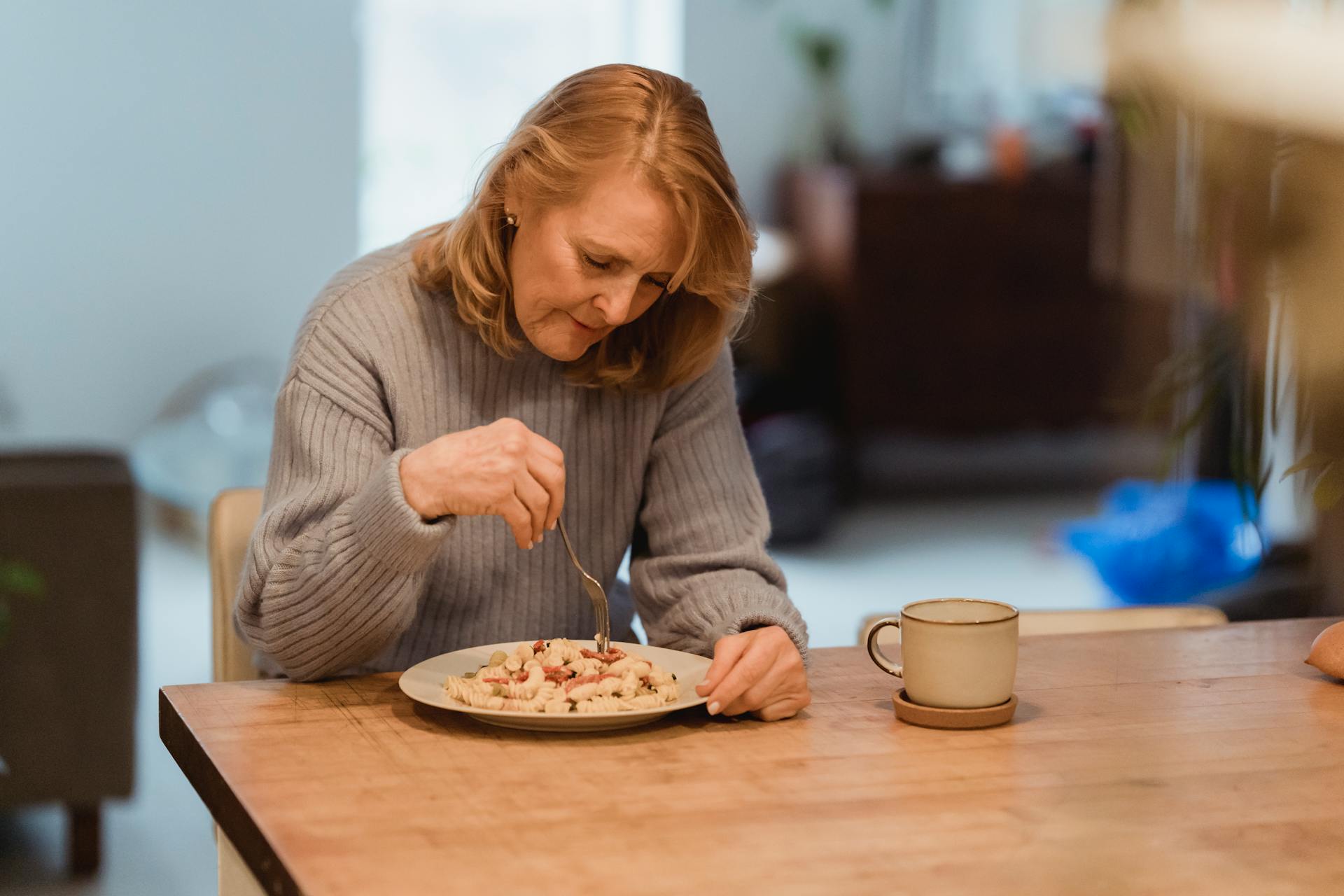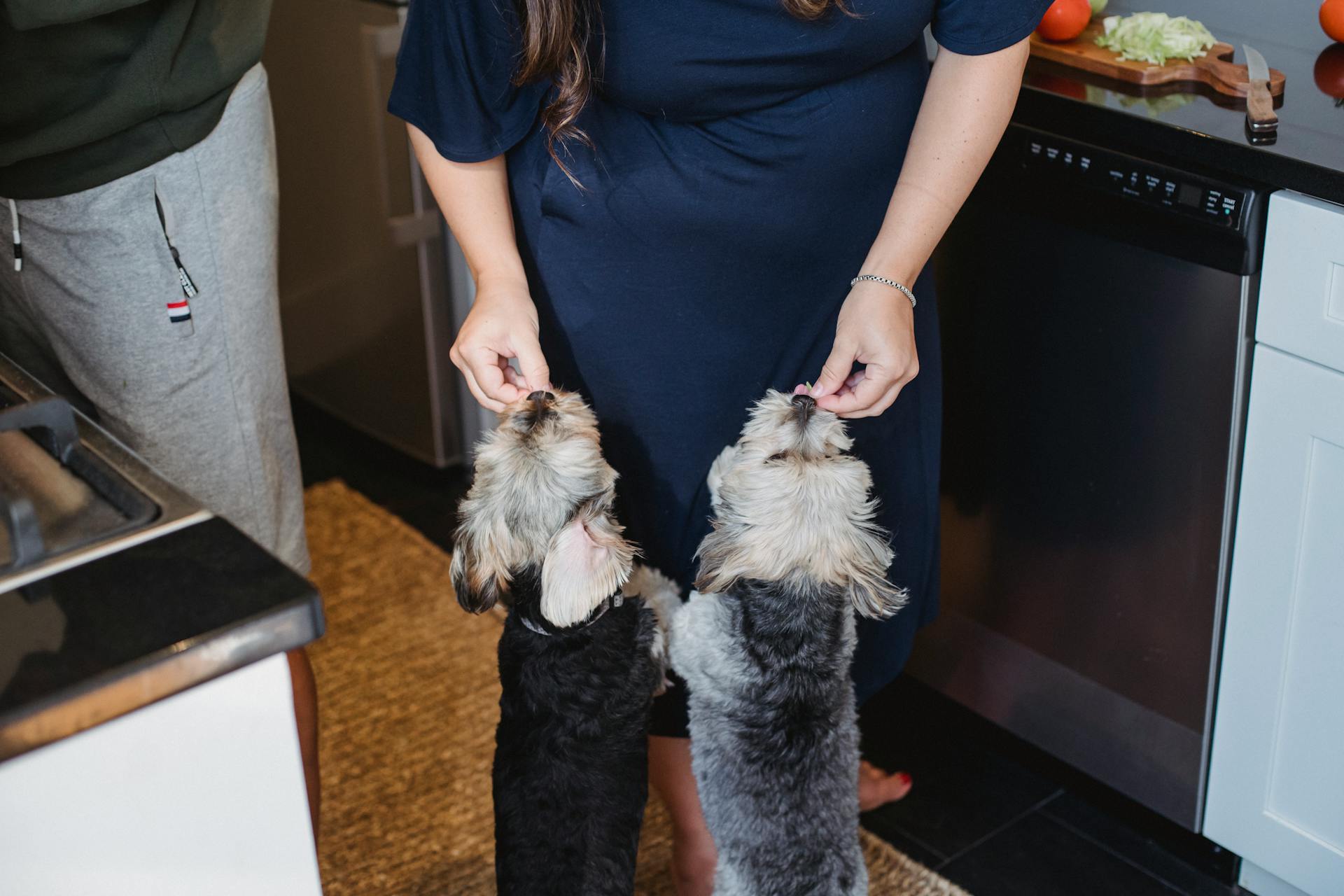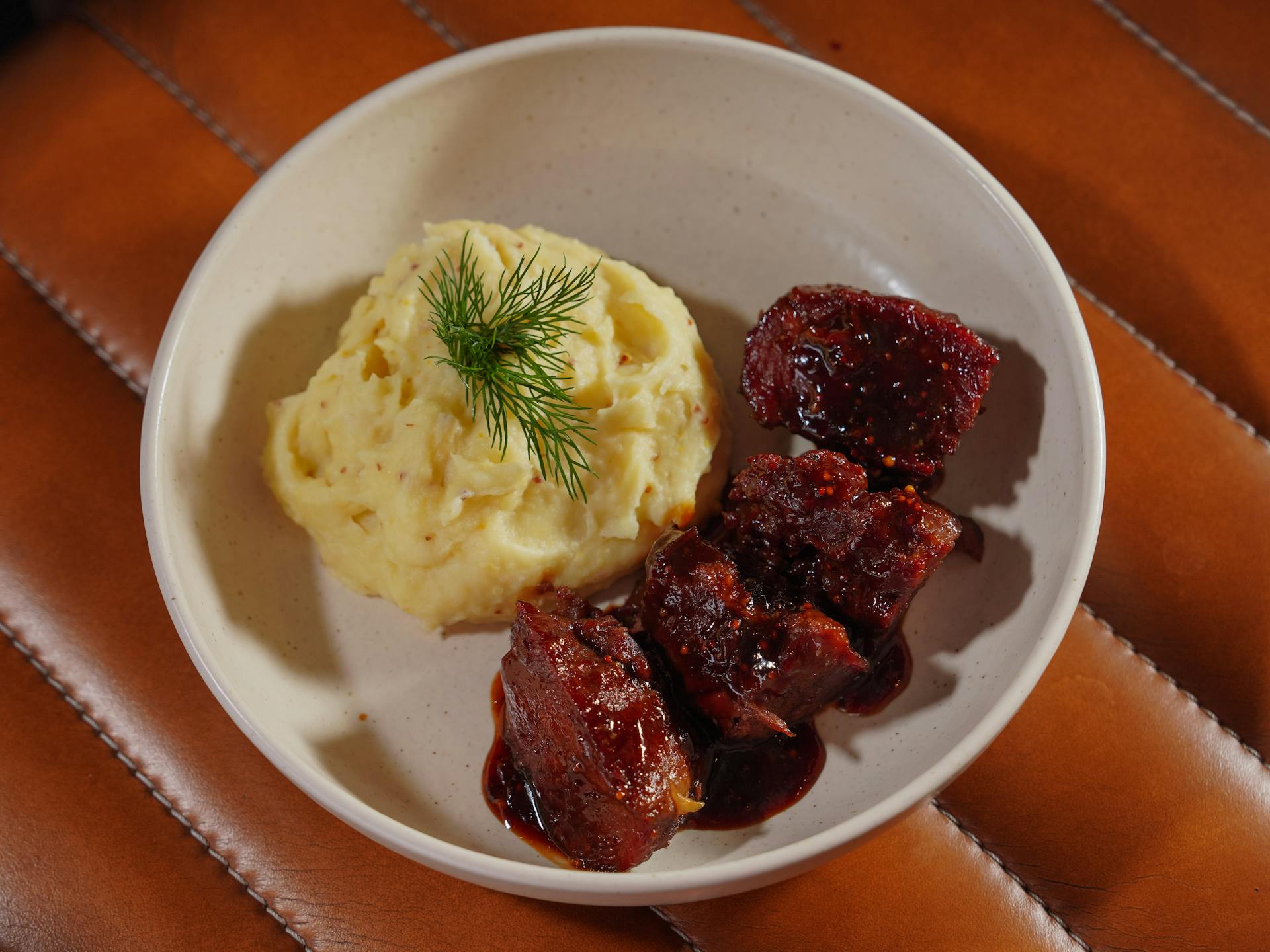
As dogs age, their nutritional needs change, and it's essential to adjust their diet accordingly. Senior dogs require a balanced mix of protein, fat, carbohydrates, vitamins, and minerals to maintain their overall health.
Aging dogs need more protein to support muscle mass and joint health. Aim for a senior dog food with at least 25% protein content.
Dental health is also crucial for senior dogs, with 80% of dogs over 3 years old experiencing some level of dental disease. A senior dog food with added dental benefits, such as omega-3 fatty acids, can help reduce tartar and plaque.
Maintaining a healthy weight is vital for senior dogs, with obesity being a significant risk factor for various health issues. Feeding a senior dog food with controlled calorie intake can help achieve and maintain a healthy weight.
Intriguing read: Is High Protein Dog Food Good for Dogs
Nutrient Requirements
As dogs age, their nutrient requirements change, and it's essential to ensure they get the right balance. Healthy mature and senior dogs need to avoid nutrient excesses by not feeding products marketed as "all life stages", which are formulated for growing puppies.
A dog's daily calorie intake should be controlled to reduce the risk of obesity and other diseases. Eating 20% to 25% fewer calories has been shown to slow the progression of age-related changes and increase a dog's lifespan.
To determine the right amount of food, it's crucial to get a specific portion recommendation from your veterinarian and divide the daily volume into two, three, or four small meals. This will help you monitor your dog's weight and body condition score.
Here's a rough guideline for senior dog nutrient requirements:
In summary, senior dogs require a balanced diet with appropriate levels of fat, protein, phosphorus, and sodium. By controlling calorie intake and avoiding nutrient excesses, you can help your senior dog live a long, healthy life.
Bone Health
As dogs age, joint deterioration occurs due to increased friction between the bone and cartilage. This can cause bone-on-bone contact, leading to discomfort and related issues like altered gaits and changes in activity levels.
Joint health is crucial for a dog's overall well-being, and research suggests that a combination of chondroitin sulphate and glucosamine can have a positive effect on moderate-to-severe knee pain in humans. It's likely that these supplements have a similar effect on aging dogs.
The effects of these supplements are not instant, and studies show that it takes approximately a 3-month period between the beginning of supplementation and the reduction of symptoms.
Balanced Nutrient Mix
A balanced nutrient mix is crucial for your senior dog's overall health. A senior dog needs more protein in her diet than a younger dog, around 50% more to maintain muscle mass.
Eating a diet rich in meat-based protein won't strain a healthy older dog's kidneys, but if your dog has kidney disease, ask your vet about prescribing an appropriate diet. Healthy seniors need 28 to 32% protein on a dry-matter basis to satisfy their needs.
It's essential to include treats and snacks in your discussion with your veterinarian about your senior dog's food choices. Many dog treats are loaded with excess calories, so opt for low-calorie treats or healthy snacks like water-based vegetables.
Check this out: Heart Healthy Food for Dogs

Here are some healthy snack options for your senior dog:
- Water-based vegetables like green beans, carrots, cucumbers, broccoli, and lettuce
- Fruits like apples, bananas, oranges, or berries
A balanced diet should also have appropriate levels of fat, phosphorus, and sodium. Excessive sodium can contribute to kidney disease and hypertension, so it's essential to keep an eye on your senior dog's sodium intake.
Your veterinarian may suggest purchasing commercial treats that reflect the nutrient balance of your dog's chosen senior diet. Be sure to monitor your senior dog's weight and adjust their food accordingly, as a decrease or absence of appetite can signal an underlying medical problem.
Skin and Coat Health
As dogs age, their skin and coat health can decline due to changes in their physiology, such as a loss of elasticity in the skin leading to wrinkling.
Hair follicle atrophy can cause hair loss, and a decrease in oil secretion can lead to dry and flaky skin.
The loss of melanocytes causes the loss of pigmentation of the hair follicles, resulting in a noticeable change in appearance.
Skin and coat health is one of the most noticeable aging changes in senior dogs.
Senior dog foods can benefit this important area of health with various components.
Some senior dog foods specifically work to keep their skin and coat healthy.
Immune System Health
As dogs age, their immune system starts to decline due to a compromised ability to produce proteins and cells that are essential for their defense system. This can lead to a weakened immune system.
Free radicals can cause oxidative stress, killing cells or impairing their functional capability, which contributes to the decline of the immune system. Providing dietary antioxidants can be an effective way to prevent oxidative stress and support the immune system.
Senior dog foods can help reduce inflammation and boost the immune system, making them a great option for supporting immune health. Some senior dog foods also work to help dog cognition, digestive health, joint health, mobility, and keeping their skin and coat healthy.
Dietary Considerations
As your dog ages, their dietary needs change, and it's essential to consider these changes when choosing a senior dog food. Most senior dog foods are formulated with appropriate nutrient limits and are less calorie-dense than rations for puppies and young adults.
Senior dogs may have special dietary restrictions or needs, such as food allergies or sensitivities. If your dog has developed these issues, there are senior dog foods available in specialty diets like grain-free, organic, weight management, gluten-free, or veterinary diet foods.
Some senior dog foods may contain high amounts of protein, which can be beneficial for older dogs. In fact, older dogs need more protein in their diet than younger dogs, with a minimum of 27% protein required.
A study found that supplementing senior dog food with fructooligosaccharides (FOS) and mannanoligosaccharides (MOS) can help with overall immune function by decreasing bad bacteria and increasing good bacteria in the gastrointestinal tract.
Here are some key nutrients to look for in a senior dog food:
- Calcium and phosphorus for bone health and tooth maintenance
- Omega-3 fatty acids, such as DHA and EPA, for anti-inflammatory properties and joint health
- Protein, with a minimum of 27% required for older dogs
Omega-3 Fatty Acids
Omega-3 fatty acids are essential for a dog's overall health, particularly for senior dogs.
These fatty acids, including DHA and EPA, have been shown to improve gait score and reduce lameness in dogs with osteoarthritis. Omega-3 fatty acids also have noticeable anti-inflammatory properties, making them a great addition to senior dog diets.
A good source of omega-3 fatty acids in dog foods includes fish oils, particularly from salmon and herring, as well as flaxseed.
Flaxseed is a rich source of alpha linoleic acid (ALA), which can be converted by the dog into DHA and EPA to carry out various functions in the body.
It's recommended to have a balanced ratio of omega-6 to omega-3 fatty acids in a dog's diet, with a ratio of 5:1 to 10:1 being ideal for optimal health.
To achieve this balance, it's essential to supplement omega-3 fatty acids in a closer ratio to omega-6 fatty acids, which are more inflammatory.
Calcium and Phosphorus
Calcium and phosphorus are essential nutrients for aging dogs, necessary for maintaining strong bones and preventing injuries or erosion. Both are required according to AAFCO guidelines and should be included in a senior dog diet.
Calcium is crucial for bone health, and phosphorus complements it perfectly. Dogs need a ready supply of these two nutrients to maintain their bone strength.
Vitamin D is necessary for calcium absorption, and its active form, calcitriol, is formed with adequate vitamin D. If vitamin D is lacking, the body will draw from its stores, weakening bones and teeth.
Calcium and phosphorus also play a vital role in maintaining tooth health in dogs, and their importance cannot be overstated.
Fructooligosaccharides and Mannanoligosaccharides
Fructooligosaccharides and mannanoligosaccharides are two types of indigestible oligosaccharides that can benefit a dog's gut health.
These compounds work in different manners, but both have a positive effect on a dog's overall health. FOS, or fructooligosaccharides, provide a source of energy for good gut bacteria in dogs.
Constipation prevention and treatment can be carried out by supplementing FOS, which affects the gut bacteria in a beneficial way. MOS, or mannanoligosaccharides, works by preventing the binding of bad bacteria in the gut.
By supplementing both FOS and MOS together, a study in dogs found that it can help with overall immune function. This is due to the decrease in bad bacteria and an increase in good bacteria in the gastrointestinal tract.
Supplementing with FOS and MOS was found to have no detrimental effects on food consumption, stool quality, or stool output in the study.
Additional reading: Authority Gut Health Dog Food
Vitamin E
Vitamin E can have a positive effect on brain and cognitive health in senior dogs.
The addition of Vitamin E as an antioxidant in senior dog food can help prevent oxidative damage from occurring.
Reactive oxygen species can develop in the brain and cause oxidative stress if they're not subdued by antioxidants.
Vitamin E works to prevent this damage by being a fat-soluble vitamin.
Mitochondrial aerobic metabolism is thought to be the largest source of reactive oxidative species.
As dogs age, their mitochondria's function declines, causing an increase in the production of oxidative species.
Studies have shown that older dogs supplemented with antioxidants, including Vitamin E, were able to correctly perform tasks more often than senior dogs whose diets were not supplemented.
In senior dogs consuming antioxidant-enriched diets, there was an increase in positive behavioral actions during the feeding period compared to senior dogs consuming diets that were not supplemented.
Expand your knowledge: Reactive Dog Boarding
Vitamin A
Vitamin A plays a crucial role in maintaining a healthy coat in aging dogs.
Dogs can convert beta-carotene into Vitamin A, so they don't necessarily need a direct source of Vitamin A in their diet.
Vitamin A supplementation in senior dog diets can help them maintain their coats as their sebaceous activity and skin elasticity decrease.
Milk, egg yolk, and liver are good sources of Vitamin A that can be included in a senior dog's diet.
Carrots are a rich source of beta-carotene, the inactive form of Vitamin A.
Zinc
Zinc is one of many trace minerals recommended for dogs of all ages.
As dogs age, they experience loss of elasticity and dryness of the skin.
The addition of zinc in the diet aids in the development of collagen and wound healing.
Senior dogs can obtain zinc in their diet through the addition of various ingredients, including red meats, whole grains, poultry by-product meals, and fish meals.
Riboflavin
As your dog ages, their nutritional needs change, and riboflavin is one of the essential vitamins that become more crucial.
Senior dogs require a larger amount of riboflavin for maintenance compared to adult dogs.
Riboflavin plays a vital role as a cofactor for the metabolism of carbohydrates, which is essential for energy production.
A deficiency in riboflavin can cause alterations in blood supply to the cornea, leading to impaired vision and potential blindness.
This highlights the importance of including a reliable source of riboflavin in your senior dog's diet to prevent changes that aging can cause on skin.
Riboflavin is also essential for maintaining healthy skin, preventing cracking and dryness, as well as a darkening of the pigmentation of skin.
If this caught your attention, see: What Food Is Good for Dogs Skin and Coat
When is a Considered?
Dogs are considered senior when they reach the last 25% of their expected lifespan. This can vary depending on breed and size.
Small breed dogs tend to live longer than large and giant breeds, so they're considered senior at 10-11 years of age. Large and giant breed dogs, on the other hand, are considered senior between 5 and 8 years of age.
Intriguing read: Next Level Giant Breed Dog Food

A small dog can live to be as old as 20 years, but a large dog can reach maturity much sooner. This means that small dogs are generally considered senior at 7 years of age, while larger breed dogs tend to have shorter life spans and are often considered senior when they are 5 to 6 years of age.
Dogs are naturally more prone to obesity as they age, and older dogs need 20% fewer total calories than middle-aged adult dogs. This is because of decreased physical activity and slowed metabolism.
Check this out: Jack Russell Considered
Types of
Senior dogs may have dental problems that make chewing difficult or uncomfortable.
There are different types of senior dog food available, including grain-free, organic, and weight management formulas.
Some senior dog foods are specifically designed to be low in calories, while others may be higher in protein to help maintain muscle mass.
If your dog has a food allergy or sensitivity, you should consider a senior dog food that is formulated to avoid common allergens.

Some senior dogs may have trouble bending down to the food bowl or standing for long periods to eat, so serving meals on a raised platform or encouraging them to eat lying down can be helpful.
Here are some common types of senior dog food:
Should Seniors Eat?
Older dogs can have reduced appetite, and it's essential to rule out underlying health problems like dental disease, diabetes, kidney disease, or cancer before trying to stimulate their appetite.
A common cause of reduced appetite in seniors is gastrointestinal problems, such as nausea.
Adding warm water, chicken broth, or a small amount of canned food to their dry food can make it more appealing to older dogs.
Home-cooked meals can also entice seniors to eat, as the extra smell and TLC can make a difference.
Some owners feed their dogs combinations of foods, like cooked chicken and barley or cooked lamb and rice.
Recommended read: Common Diseases in Labradors

Medications like appetite stimulants can help, but should only be used after a veterinarian has ruled out serious diseases.
Not all older dogs need to eat senior food, especially if they're healthy and on a quality, balanced diet.
If your older dog is overweight, feeding them a low-calorie food can help them lose or maintain their weight without feeling hungry all the time.
Older dogs need 20% fewer total calories than middle-aged adult dogs due to decreased physical activity and slowed metabolism.
A low-calorie food can also reduce the strain on their joints, which may already be inflamed from arthritis, hip dysplasia, or a luxated knee cap.
Older dogs need more protein in their diet than younger dogs, as they need to replace wasting muscle mass as they age.
A dog food rich in meat-based protein can help, but if your dog has kidney disease, be sure to ask your vet about an appropriate diet.
Related reading: Do Small Dogs Need Small Breed Food
Wet
Wet dog food is a great option for dogs that need a little extra help with hydration. It contains a lot of water, so if your dog isn’t drinking as much as they used to, it can help them get the water intake they need.
Dehydrated dogs will benefit from wet food, as it provides the extra moisture they need. It's also a good choice for dogs with dental problems, as it's easy to chew since it's soft.
Wet food is typically a lower-calorie choice than dry food, thanks to its higher water content. This makes it a good option for dogs that need to watch their weight.
A different take: How to Make Dog Treats from Wet Food
Sources
- https://en.wikipedia.org/wiki/Senior_dog_diet
- https://vcahospitals.com/know-your-pet/feeding-mature-and-senior-dogs
- https://www.dogfoodadvisor.com/best-dog-foods/senior-dog-food/
- https://www.webmd.com/pets/dogs/features/senior-dog-food
- https://www.akc.org/expert-advice/nutrition/nutritional-needs-for-senior-dogs/
Featured Images: pexels.com


